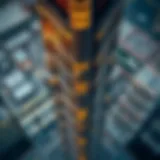Understanding the Strategic Location of Dubai Industrial City


Intro
Dubai Industrial City (DIC) represents not just a zone, but a hub pulsating at the heart of the United Arab Emirates' industrial ambitions. Nestled within Dubai's sprawling landscape, it stands as a testament to the city’s commitment to economic diversification and development. This article will delve into the critical relevance of DIC's location, emphasizing its geographical significance, connectivity, and the manifold advantages it provides to investors and businesses.
In an age where location can often dictate success, DIC offers an intriguing case study. It boasts strategic proximity to major transport hubs, including the Al Maktoum International Airport and Jebel Ali Port, which are lifelines for logistics and trade. Here, we will explore how these factors shape the industrial growth narrative and outline key insights into market trends, property investments, and future opportunities for stakeholders.
By weaving together elements of industrial development, infrastructure advantages, and investor sentiments, we aim to ensure readers grasp the sensitive nuances of this unique industrial landscape. Get ready to dive deep into an exploration of a location that is more than mere coordinates on a map, but a vital component of Dubai's broader economic tapestry.
Market Trends
Current Market Analysis
The industrial market in Dubai is robust, with Dubai Industrial City positioned as a cornerstone. As of 2023, the demand for warehouses and manufacturing spaces is surging, driven by a burgeoning e-commerce sector and an increased focus on local manufacturing. The availability of larger plots of land within DIC, coupled with favorable lease rates, makes it an attractive option for businesses looking to establish operations in the UAE.
Investors are particularly drawn to DIC’s unique mix of zoned land, ranging from logistics to light manufacturing. This diversity allows companies to customize operations according to their specific needs, whether that entails warehouses equipped with state-of-the-art technology or manufacturing facilities designed for efficiency. The infrastructure supporting the area—with top-notch roads and utilities—further solidifies its appeal.
Future Predictions
Looking ahead, the forecast for DIC is positively bright. With advancements in technology and sustainability becoming imperative, businesses within this industrial hotspot are expected to adapt and thrive, focusing on sustainable practices and renewables.
Some crucial points to consider include:
- Investment influx: The anticipated rise in foreign direct investment could potentially redefine the landscape of industrial operations in Dubai.
- Green initiatives: Growing emphasis on environmentally friendly practices ensures that businesses will have to innovate, aligning with global sustainability trends.
- Technological integration: As automation and smart technologies permeate various industries, DIC is likely to attract tech-driven companies ensuring operational efficiency.
“Location isn’t just a point on a map; it’s the backbone of economic vitality.”
Given these dynamics, the next logical step is exploring the specifics of property investment within Dubai Industrial City, assessing the types of properties available and effective financing options for potential investors.
Property Investment Insights
Types of Investment Properties
DIC provides a medley of investment properties tailored to cater to diverse industrial needs. Among the available options are:
- Warehouses: Large spaces designed for storage and distribution, ideal for e-commerce ventures.
- Flexi-offices: Spaces that facilitate both office and industrial use, offering great versatility to startups and small businesses.
- Manufacturing facilities: Customizable buildings suitable for companies focused on production and assembly processes.
This variety ensures a wide palette for investors wanting a foothold in the industrial sector, appealing to both small enterprises and large corporations alike.
Financing Options and Tips
When it comes to financing these investments, various avenues exist:
- Bank Loans: Traditional financing through banks usually offers competitive interest rates for established businesses with strong credit histories.
- Government Grants: Potential support from UAE governmental bodies can aid in establishing industrial operations that align with national interests.
- Partnerships: Collaborating with local firms can diminish financial risks while providing invaluable insights into the market.
In summary, understanding the nuances of Dubai Industrial City is crucial for anyone looking to invest in this vibrant economic landscape. With a strategic location, diverse types of properties, and various financing options, DIC stands out as a prime spot for industrial growth in the UAE.
Understanding Dubai Industrial City
Dubai Industrial City (DIC) is more than just a sprawling zone filled with warehouses and factories; it's a vital cog in the machinery of Dubai's growing economy. When one examines DIC, the importance of comprehending its intricacies becomes glaringly evident. This understanding not only reveals how the region fits into the larger economic puzzle of Dubai but also sheds light on potential opportunities for investors, expats, and businesses.
A key element to consider when diving into the nuances of DIC is its strategic location. Situated close to major transport hubs and within reach of international markets, DIC serves as a favorable launch pad for enterprises looking to establish their presence in the Middle East. Furthermore, grasping the historical context enhances our knowledge of its vision and objectives. DIC is not merely a result of chance; it was thoughtfully developed in alignment with Dubai's broader aspirations to diversify its economic landscape beyond oil dependency.
Moreover, a deep dive into the benefits that come with operating in and around DIC provides clarity on why businesses are flocking to this area. Its robust infrastructure, supportive regulatory frameworks, and proximity to both air and sea transport channels make it a strong player in global logistics and trade.
In summary, understanding Dubai Industrial City is not just about knowing where it is or what it looks like. It's about appreciating the layers of economic insights, historical foundations, and future potentials that lie within its boundaries. This knowledge is foundational for anyone looking to engage with the opportunities presented by DIC.


Preamble to Dubai Industrial City
Dubai Industrial City stands as a testament to the emirate's commitment to fostering industrial growth. Launched in 2004, DIC was designed to provide an integrated ecosystem for industries ranging from textiles to food production. Its proximity to Dubai's key logistical and commercial areas makes it a prime location for companies seeking to enhance their operational efficiency.
To fully appreciate the significance of DIC, one must recognize its vision. It aims to create a competitive environment that not only attracts investment but also nurtures business development. The infrastructure is tailored to support various industries, boasting ample land for factories, warehouses, and logistics hubs.
The essence of Dubai Industrial City lies in its vision to establish a self-sustained industrial cluster that integrates seamlessly with other parts of Dubai, contributing significantly to the region's GDP. This vision has drawn various international companies, ensuring a melting pot of industries and fostering diverse economic growth.
Historical Development and Vision
To understand DIC’s historical development, one must look at the broader picture of Dubai’s economic ambitions in the early 2000s. At that time, Dubai recognized the urgent need to diversify its economy in light of the oil-dependent model. This foresight led to the establishment of DIC, envisioned as a hub for manufacturing and logistics.
The overarching goal was clear: attract global investments and stimulate local business growth. By providing a robust infrastructure, tailored facilities, and business-friendly regulations, DIC quickly became an attractive destination for a variety of industries. As years rolled by, the vision evolved into a flourishing reality with tangible impacts on employment and business opportunities.
The development milestones are noteworthy, reflecting a dynamic approach to industrial growth. Initially focused on textile and heavy industries, DIC has opened its arms to fields such as food processing, logistics, and light manufacturing. Its adaptability and willingness to evolve in line with market demands depict a forward-thinking mindset, which is fundamental for sustained success.
Ultimately, the historical narrative of Dubai Industrial City is one of ambition, adaptability, and industrious spirit—one that continues to shape the economic landscape of Dubai today.
Geographical Significance
Understanding the geographical significance of Dubai Industrial City is crucial in comprehending its role within the broader economic spectrum of Dubai. The strategic positioning of this industrial hub is a cornerstone that supports not only local businesses but also attracts international investments. This section delves into how the location of Dubai Industrial City offers several advantages that directly influence its appeal and functionality for diverse stakeholders.
Location within Dubai
Nestled in the southwest part of the emirate, Dubai Industrial City covers a vast area that integrates seamlessly with urban life while also promoting industrial growth. Its proximity to other bustling parts of Dubai, such as Al Maktoum International Airport and the Jebel Ali Port, plays a vital role in making it a preferred choice for enterprises needing efficient logistics and accessibility.
One cannot overlook the significance of the neighborhoods nearby. From Dubai Investments Park to Dubai South, these locales provide the necessary synergy that encourages collaboration and resource sharing among companies. Additionally, with easy access to prominent suburbs, businesses have the advantage of tapping into a skilled labor market. Commuting for employees remains convenient, directly impacting productivity.
Proximity to Major Highways
Another layer to consider is the proximity of Dubai Industrial City to major highways, particularly Sheikh Zayed Road and Emirates Road. This aspect not only simplifies transportation logistics for goods but also enhances connectivity for people working in the area. A well-planned road network means that businesses can distribute products swiftly, thus addressing customer demands in a timely manner.
Furthermore, the accessibility provided by these highways encourages the movement of raw materials and finished goods. Being part of a larger transportation network minimizes potential delays and can significantly reduce costs associated with logistics. For companies operating within the industry, this translates to heightened efficiency and improved service delivery.
"In the world of trade, time is money. Proximity to highways is not just a convenience; it can mean the difference between profit and loss."
Moreover, as the city expands, the continual investment into infrastructure related to these highways ensures that the industrial city will not be left behind. Continuous government and private sector initiatives to improve road systems reflect a commitment to sustaining growth and ensuring that businesses can thrive amidst evolving market conditions.
In summary, the geographical significance of Dubai Industrial City is marked by a blend of strategic location, robust infrastructure, and access to essential transport links. These elements work collectively to enhance business operations, making this area a vital component of Dubai’s industrial landscape. Whether one is an investor eyeing potential opportunities or a company seeking operational advantages, understanding these geographical nuances provides a comprehensive view of what makes Dubai Industrial City a prime location for industrial development.
Impact on Industrial Development
The significance of the Impact on Industrial Development in Dubai Industrial City can’t be overstated. Its strategic positioning within Dubai is not just a matter of geography but a catalyst that fuels economic expansion and industrial progress. As investors, expats, agents, managers, and buyers look for promising areas, understanding how this location shapes industry becomes paramount.
Link to Economic Growth
The link between Dubai Industrial City’s location and economic growth is tightly woven into the very fabric of its existence. Situated just off major transportation corridors and in proximity to vital commercial hubs, the area is a magnet for foreign investment and local entrepreneurship alike. Its layout facilitates seamless integration with the broader economic strategy of Dubai, a city that is synonymous with progress and modernity.
- Access to both the Sheikh Mohammed Bin Zayed Road and the Dubai-Al Ain Road ensures that businesses can operate without the usual bottlenecks, crucial for supply chains.
- The presence of dedicated zones for manufacturing and logistics within the city promotes specialization. This specialization not only enhances productivity but also attracts complementary businesses, strengthening the local economy further.
In essence, Dubai Industrial City provides a fertile ground for various sectors, from logistics to heavy industry. Such diversification is essential for resilience against market fluctuations. Moreover, global companies can tap into a dynamic workforce, leveraging Dubai's reputation as a melting pot of cultures and skills. This rallies corporate interest and encourages businesses to set up operations, driving economic vitality forward.
Supportive Infrastructure
Complementing the prime location is the supportive infrastructure that Dubai Industrial City boasts. In the fast-paced world of business, the right infrastructure can be a game changer. Here are several key aspects that contribute to its reputation as an industrial powerhouse:


- Advanced utilities: The area is equipped with state-of-the-art utilities, including reliable electricity and water supply, crucial for any industrial operation.
- Transportation network: With easy access to airports and seaports, goods can be shipped or flown quickly, ensuring businesses remain competitive in a global market. The ease of movement is a logistical advantage that cannot be overlooked.
- Telecommunications infrastructure: High-speed internet and modern communication networks are essential for businesses today, and Dubai Industrial City delivers on this front, allowing companies to conduct their operations without tech hindrances.
"The infrastructure in Dubai Industrial City replicates the ambitions of businesses striving for excellence. It’s not just about having brick and mortar; it’s about creating an environment where innovation thrives."
These elements converge to create an environment that favors growth and reduces operational headaches. Whether it’s establishing a new manufacturing facility or expanding an existing one, investors find peace of mind knowing that the support systems are in place. The combination of location and infrastructure is indeed a recipe for success that attracts various stakeholders within the industrial sector.
Accessibility Factors
Accessibility is a cornerstone of any industrial hub, and Dubai Industrial City shines in this regard. The ease with which goods and people can flow in and out plays a pivotal role in attracting businesses and investors. As we dive into the two main accessibility factors—air transportation links and sea port access—we uncover layers of benefits that not only bolster Dubai’s position in the global market but also create a ripple effect enhancing the local economy.
Air Transportation Links
The air transportation network in and around Dubai Industrial City is more than just a series of runways and terminals; it represents the gateway to the world. Dubai International Airport and the newer Al Maktoum International Airport are both within striking distance, offering a range of flight connections to every corner of the globe.
For businesses based here, having access to multiple international airports is invaluable.
- Efficiency in Logistics: When goods can be shipped quickly, businesses save money and time, a crucial factor in today’s fast-paced market. The airport facilities include extensive cargo handling capabilities, further aiding the logistics process.
- Facilitating Quick Business Travel: Expats, investors, and managers traveling for business find ease of access to major cities worldwide a substantial plus. This fluidity helps foster connections and partnerships.
In essence, the air transport network is not just a convenience; it's an essential element of operational strategy for many firms. The potential for high-frequency flights allows Dubai Industrial City’s residents and businesses to tap into global supply chains and market opportunities at lightning speed.
Sea Port Access and Trade Opportunities
On another front, the proximity to one of the busiest ports in the Middle East, Jebel Ali Port, elevates Dubai Industrial City into a league of its own. This port is a critical hub for global maritime trade, providing yet another layer of connection to the international market.
- Bulk Cargo Handling: One key aspect is the capability to handle bulk cargo efficiently. Companies in logistics and manufacturing benefit greatly from swift loading and offloading processes at the port.
- Cost-Effective Trade: The strategic location allows for lower shipping costs and reduced transit times. This is especially beneficial for businesses involved in importing raw materials or exporting finished goods.
- Diverse Opportunity Landscape: The port supports a wide range of industries—from textiles to technology—creating a multifaceted trade ecosystem. Hence, whether it's raw materials flowing in or goods sailing out to international markets, companies experience a smooth operational landscape.
In summary, Dubai Industrial City’s accessibility via air and sea is not merely an advantage but a necessity for any business aiming to thrive in a competitive landscape. Leveraging these transportation links can lead to significant operational efficiencies and open doors to global markets.
Overall, accessibility factors encompass far more than just logistics. They frame the narrative for investment decisions and economic growth, establishing a compelling case for why Dubai Industrial City is a prime location for businesses targeting success.
Advantages of the Location
In today’s fast-paced world, the need for businesses to strategically position themselves can’t be understated. Dubai Industrial City offers distinct advantages that play a substantial role in attracting both local and international investment. This area is not merely a location; it’s a dynamic hub where opportunity meets infrastructure. Understanding these benefits can illuminate why so many investors, expats, and professionals are casting their nets in this promising locale.
Investment Potential
Investing in Dubai Industrial City isn’t just about acquiring space; it’s about tapping into a thriving ecosystem. The potential for financial growth is indeed compelling, supported by several key factors:
- Government Incentives: The UAE government provides numerous incentives aimed at supporting businesses, such as tax holidays and customs duty exemptions. This not only eases the financial burden but also enhances profitability for companies operating in this space.
- Diverse Industries: This area accommodates a wide range of sectors, including manufacturing, logistics, and trade. Such diversity means an investor isn’t putting all their eggs in one basket; rather, they’re part of a multifaceted economic landscape that is resilient to market fluctuations.
- Property Value Appreciation: Given the ongoing developments and infrastructural upgrades, properties in Dubai Industrial City are predicted to appreciate over time. This trend makes it attractive for buyers looking for long-term investment returns.
Moreover, the potential for expansion in this area is considerable. As businesses adapt to the changing market conditions and consumer demands, the flexible zoning laws provide the freedom for businesses to grow without bureaucratic hurdles.
Logistics and Supply Chain Benefits
For companies that depend heavily on logistics, location is everything. The advantages of Dubai Industrial City in this regard are significant:
- Strategic Positioning: Being situated close to major transport links means that goods can be imported and exported with minimal delays. The proximity to the Jebel Ali Port and Al Maktoum International Airport creates a seamless connection for global trade, making this site ideal for businesses focused on logistics and supply chains.
- Efficient Connectivity: The road networks are well-planned and maintained, ensuring smooth transit from the industrial site to key destinations across Dubai and beyond. This connectivity is critical for organizations focused on time-sensitive deliveries.
- Integrated Logistics Solutions: Many firms find that the local infrastructure supports integrated logistics solutions, streamlining operations from warehousing to distribution. This is essential in reducing costs and improving profitability.
“In logistics, time is money. The quicker your goods move, the more competitive your business becomes.”
Integration within Free Zones
One of the standout features of Dubai Industrial City is its seamless integration within the wider framework of free zones. This integration is not just a bureaucratic formality but a strategic advantage that has significant implications for businesses and investors. The notion of free zones in Dubai carries with it a promise of simplified regulations, tax exemptions, and enhanced operational capabilities. For companies operating in this environment, the benefits are plentiful, presenting an opportunity for both regional and international players to tap into the bustling Dubai market and beyond.
Navigating Free Trade Areas


Understanding how to navigate the free trade areas in Dubai Industrial City is essential for anyone looking to establish or expand their business. Within these zones, companies often enjoy a myriad of perks such as:
- 100% foreign ownership of businesses, which is rare in many other jurisdictions.
- Zero import and export duties, making it more economically viable to conduct international trade.
- Simplified customs procedures, which can significantly reduce the time and costs associated with moving goods.
Moreover, the strategic geographical positioning of Dubai, coupled with the robust free trade agreements that the UAE has entered into with various countries, enhances the attractiveness of these free zones. The ease of access to diverse markets can mean the difference between merely surviving and thriving in today’s competitive business landscape. Companies often find that their operational processes are streamlined, allowing them to focus more on growth strategies rather than getting bogged down by red tape.
Regulatory Framework and Support
A solid regulatory framework underpins the success of businesses operating within the free zones of Dubai Industrial City. This framework is crafted to create a conducive environment where innovation and entrepreneurship can flourish. The local government is known for being supportive of businesses, offering a blend of regulations that are both encouraging and protective. Some critical elements of the regulatory landscape include:
- Comprehensive licensing processes that ensure businesses can be operational quickly without excessive delays.
- Regulatory bodies that actively engage businesses, providing clarity on compliance requirements.
- Continuous support services, from real estate assistance to logistical help, tailored to meet the specific needs of various sectors.
The government’s proactive stance on nurturing businesses is evident in its ongoing initiatives aimed at attracting talent and investment. These efforts not only enhance the appeal of operating within free zones but also contribute significantly to the economic health of the region.
In essence, the integration of free zones within Dubai Industrial City encapsulates a holistic approach to industrial development, underscoring the critical role that this interplay of factors plays in shaping the business landscape of Dubai. By offering a combination of enticing tax structures and operational efficiencies, the free zones stand as pivotal points for investment and growth, paving the way for future advancements in industrial real estate.
Future Prospects
The future of Dubai Industrial City stands at a pivotal crossroads, making it an important topic for anyone looking to invest or engage in industrial activities in this booming region. As the wheels of economic growth turn, this area is set to witness a slew of developments that will reshape its landscape and draw a wide array of businesses. Understanding these future prospects helps stakeholders to position themselves strategically in a dynamic market that’s rapidly evolving.
Factors such as governmental endorsements, the global economic climate, and shifts in industrial demand directly influence how the area is perceived and utilized. Investors, in particular, should pay close attention to the upcoming developments, as they hold the potential to amplify not only property values but also to enhance operational efficiencies across various sectors.
Additionally, as technology continues to shape industries, those looking to set up shop in Dubai Industrial City may find themselves benefiting from smart city initiatives that promote sustainability, connectivity, and efficiency. These elements combined make it essential to stay informed about where the area is heading.
Planned Developments
In the context of planned developments, Dubai Industrial City is teeming with projects on the horizon. With backing from the government, particularly the Dubai Development Authority, several ambitious projects are in the pipeline aimed at enhancing infrastructure, connectivity, and facilities.
- Logistics Facilities: New logistics hubs are appearing, aimed at optimizing supply chains and reducing costs for businesses. These centers focus on advanced warehousing and distribution technologies that cater to both local and international markets.
- Industrial Parks: Expansions of existing industrial parks are underway, targeting high-tech industries such as manufacturing, electronics, and pharmaceuticals. These parks aim to provide companies with tailored solutions that include specific zoning and utilities designed for operational efficacy.
- Sustainability Projects: In alignment with global trends toward sustainability, new developments are also integrating eco-friendly technologies and practices. Initiatives like solar power adoption and waste management systems will attract businesses prioritizing green practices.
Investors can find opportunities in these developments by closely monitoring the announcements from relevant authorities. Engaging early may yield beneficial positioning within the marketplace.
Market Trends in Industrial Real Estate
As for the market trends in industrial real estate, the landscape in Dubai Industrial City is constantly shifting. Current observations reveal a few notable trends that investors and businesses should consider:
- Increased Demand: With more companies finding their way to Dubai, the demand for industrial and logistical spaces is soaring. This is particularly true for organizations looking to tap into the Middle East and African markets.
- Rental Rates on the Rise: As demand continues unabated, rental rates for prime industrial spaces are expected to increase. Being aware of these trends can be crucial for businesses evaluating their real estate strategies.
- Shift Toward Flexible Spaces: There's a rising trend for flexible units that can be adapted to various manufacturing or warehousing needs. Companies are leaning toward multi-use spaces that provide versatility as operational requirements evolve.
"Staying ahead of market trends is not just an option; it’s a necessity for investors or companies that wish to thrive in today’s competitive landscape."
Ending
In light of the synergies unearthed throughout this article, it becomes apparent that the location of Dubai Industrial City is not just a mere geographical consideration but a pivotal element in shaping the landscape for industrial and economic activities. The blend of strategic positioning, infrastructural support, and integration within free zones yields remarkable benefits for various stakeholders including investors, business owners, and logistics managers.
Summarizing Key Insights
To distill the core elements discussed, here are some key insights into the significance of Dubai Industrial City's location:
- Geographical Advantage: Situated within the Dubai emirate, the city boasts extraordinary accessibility to critical transport links, enabling efficient distribution and movement of goods.
- Economic Catalyst: Its economic prowess is reshaped by infrastructural advantages that directly foster business growth and development.
- Investment Opportunities: The area promises a lucrative landscape for investment, characterized by favorable regulatory environments and strong returns.
Additionally, these essential characteristics cohesively contribute to attracting ex-pats, agents, and managers alike who seek to harness Dubai's promising industrial avenues. Each insight underscores why stakeholders must keenly evaluate location's intrinsic value, which can make or break business success.
Final Thoughts on Location's Impact
The ripple effects of a strategic location extend far beyond immediate industrial benefits. Dubai Industrial City's thoughtful placement encapsulates what it means to operate at the crossroads of trade and commerce. The burgeoning connections to major highways and air transport lend credence to the narrative of the location being a backbone for economic dynamism.
Moreover, with the rise of global e-commerce and logistics demands, being situated in this nexus allows companies to pivot quickly in response to market changes. The marriage of location with robust infrastructure not only enhances supply chain efficiency but also elevates Dubai's profile in the global industrial arena. In a nutshell, understanding the significance of Dubai Industrial City's location equips stakeholders with crucial insights that can profoundly shape their strategic decisions as they navigate future ventures.
“In the world of business, location is the keystone that holds everything together.”
For more insights and resources, visiting sites like Wikipedia or Britannica may shed light on further related topics.











